Becoming a reseller can be incredibly rewarding, and it’s also a great entry point into entrepreneurship for those who don’t have past experience.
However, to become a successful reseller, you need a source for inventory that is profitable. Instead of going directly to a retailer like most buyers do, you can get a pricing advantage by going to a wholesaler.
In this guide, we will go over what a wholesaler is, why to use one as a reseller, and how to find one, including a list of commonly used wholesalers.
You’ll also get tips on what to look for when searching for a wholesaler for your reselling business, in addition to other pro tips that will help guide you on your entrepreneurial journey. Let's get started!
What is a Wholesaler?
A wholesaler is a vendor that sells product only in bulk. Rather than selling individual products to the public with a D2C (direct-to-consumer) business model, wholesalers are categorized as B2B (business to business), meaning that they serve businesses that wish to sell their products individually for profit.
Wholesalers are often category-specific specialists, so the individual supplier that you end up choosing will vary based on your niche. Later in this article, we’ll go over a list of suppliers that you can use depending on your realm of business operations.
Why Use a Wholesaler for Reselling?

As a reseller, using a wholesaler provides a number of advantages, including the following:
Bulk Discounts
The most obvious and immediate benefit that using a wholesaler for reselling gives is the bulk pricing discount. Many novice resellers only buy single items that are often already marked up beyond a price point that is competitive to those who buy in bulk. However, you need to have a decent budget size in order to get the best prices as generally the more inventory you buy, the greater discount you will get.
Streamlined Business Model
Running a reselling business relies heavily on sourcing profitable inventory, which can prove to be complex and time-consuming if you have to constantly jump around to piece together a substantial amount of inventory that will last you long enough to have a viable business. Using a wholesaler will make your inventory sourcing simple, which will allow you to streamline this aspect of your business model so you can allocate more time and resources toward other operations.
Steady supply of inventory
When you work with a wholesaler, you’ll be able to have a steady source of inventory. This is much simpler and more convenient compared to resellers who might be buying individual pieces of inventory, which is a more complicated way of going about sourcing. Additionally, this steady inventory supply will lead to better sales forecasting.
Potential for scale
If you find a good supplier with profitable prices and you have the budget to buy in large bulk quantities, you have the groundwork to scale a business more effectively than other resellers. The ideal situation is to have exclusive distribution rights from a wholesaler that has the best prices, which will prevent other resellers from getting product from the same source. Remember that in order to find suppliers and develop relationships that allow you to scale, you need several things, including a budget, business history, and a good relationship with your supplier - all of which might take time to build.
How to Find Wholesale Suppliers
One of the biggest questions that a beginning reseller might have is how they can find these wholesalers. Here are some places where you can do this:
Local contacts
The biggest advantage you can have as a reseller when it comes to a wholesale supplier is having access to stock that flies under the radar of the competitor’s operation. The first place that you can potentially find this is through personal or local contacts. Some wholesalers still operate in the flesh, and if you’re lucky enough to have a wholesaler that you can find and build a relationship that is local to you, not only will you get faster fulfillment, but you’ll also have the potential to get great pricing and reliability that might be harder to find from a more distant source.
Google
Since reselling is a broad category that holds a large assortment of products, with enough manual research online, you can often find a supplier. However, you need to be sure to thoroughly vet whoever you find. If you find a supplier, be sure to look up any independent reviews of the supplier, which you might find from BBB or online forums.
Existing Brands
Most brands, even the biggest names you know, are open to selling their product in bulk to independent retailers. For example, Nike has an open application that can easily be found on their website for anyone who wants to become an authorized retailer for the brand. Working with existing brands isn’t easy though, as you’ll have to meet certain requirements that are often impossible for a beginner to meet. Even if you don’t qualify to wholesale for an existing brand right now, you should keep their requirements in mind if it’s a goal of yours to do so in the future.
Wholesale Directory
Since many resellers are on the search for wholesale suppliers, and Google isn’t necessarily the most efficient way to find one, some websites act as directories for wholesalers. These websites might serve specific niches or regions, and they can be incredibly helpful for doing research for suppliers. The list of wholesale suppliers that we’ll get into next includes some wholesale directories.
11 Wholesale Suppliers for Your Reselling Business
Here’s a list of 11 wholesale suppliers that you can check out to potentially source inventory for your reselling business:
1. Alibaba

One of the largest original sources for getting products from China, whether custom-made or private label wholesale is Alibaba. Alibaba has been around since 1999 and is a top choice for resellers.
Its range of products spans every imaginable category, and the number of individual suppliers can be overwhelming. The network of wholesale suppliers inside of Alibaba isn’t just limited to China, with companies in various countries including the US on the platform.
Aliexpress is a subsidiary of Alibaba and is a great source for buying individual products if you are a dropshipper.
Pros:
- Extensive selection of products in virtually any category
- Direct access to manufacturers and wholesalers around the globe
- Detailed descriptions and reviews of sellers
- Potential for large order quantity with attractive bulk discounts
- Ability to review supplier reputation and get buyer protection on certain purchases
Cons:
- It can be difficult to filter through and find a trustworthy supplier
- Communication with companies might be difficult because of language and cultural barriers
- Shipping time and cost can be substantial
- Minimum order quantity could be outside of your budget
2. DHGate
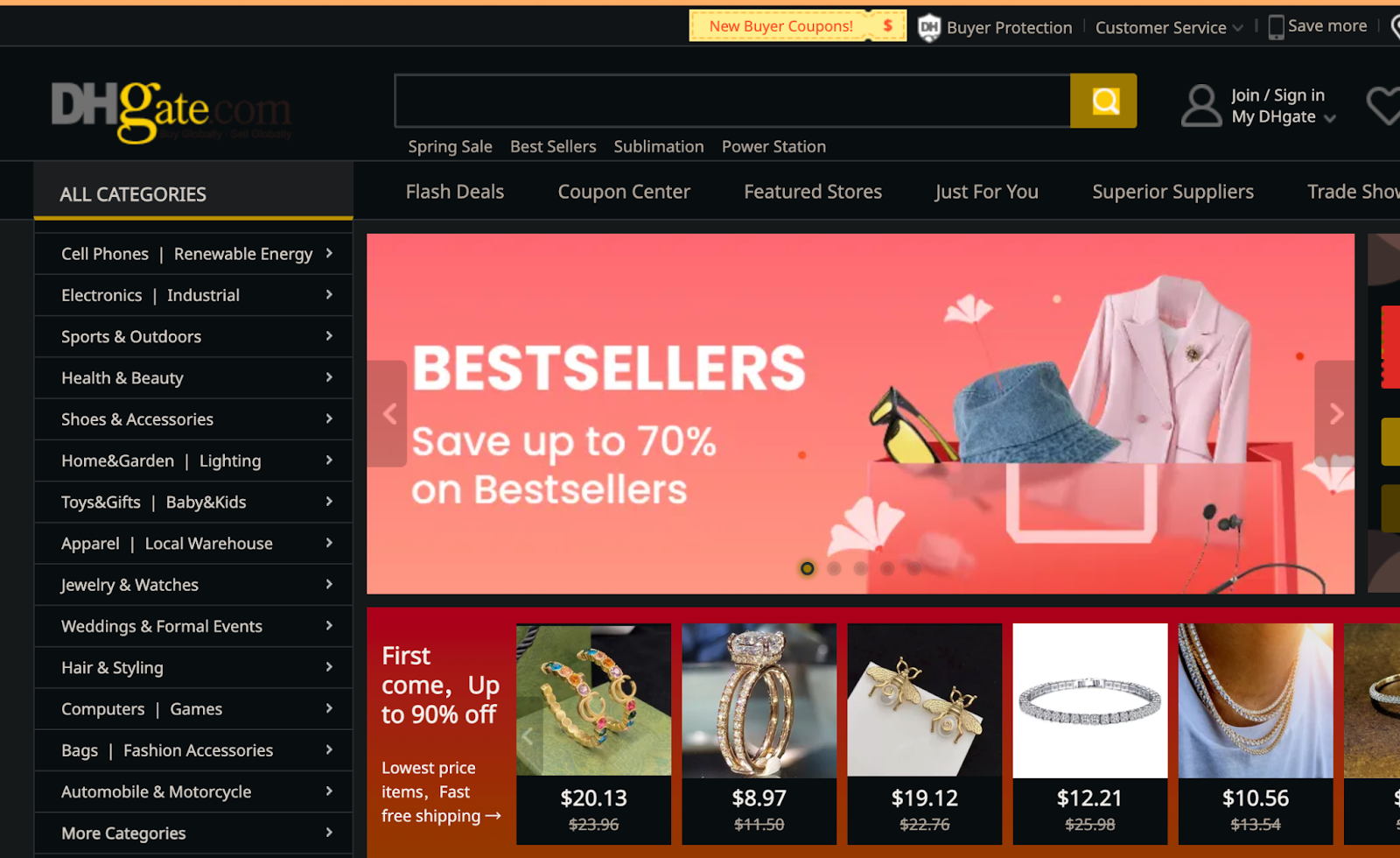
Founded in 2004, DHGate is a direct competitor to Alibaba as an online marketplace that allows resellers and ecommerce store owners to deal directly with suppliers who are mainly based in China.
While its product selection is not quite as vast as Alibaba’s, you might find pricing or products that you prefer based on what you are looking for. It’s always worth checking both of the platforms if you are interested in reselling generic, white-label-worthy product in particular.
Pros:
- Good selection of products and categories
- Less overwhelming and potentially easier to navigate than Alibaba
- Has buyer protection policies
- Tends to have a lower minimum order quantity compared to Alibaba
- Can be better to buy individual products for dropshipping in terms of pricing
Cons:
- Quality of the product can be inconsistent
- Seller communication can prove to be challenging
- Somewhat limited selection of worldwide sellers
- Overseas shipping and customs can cause delays and be costly
3. Faire
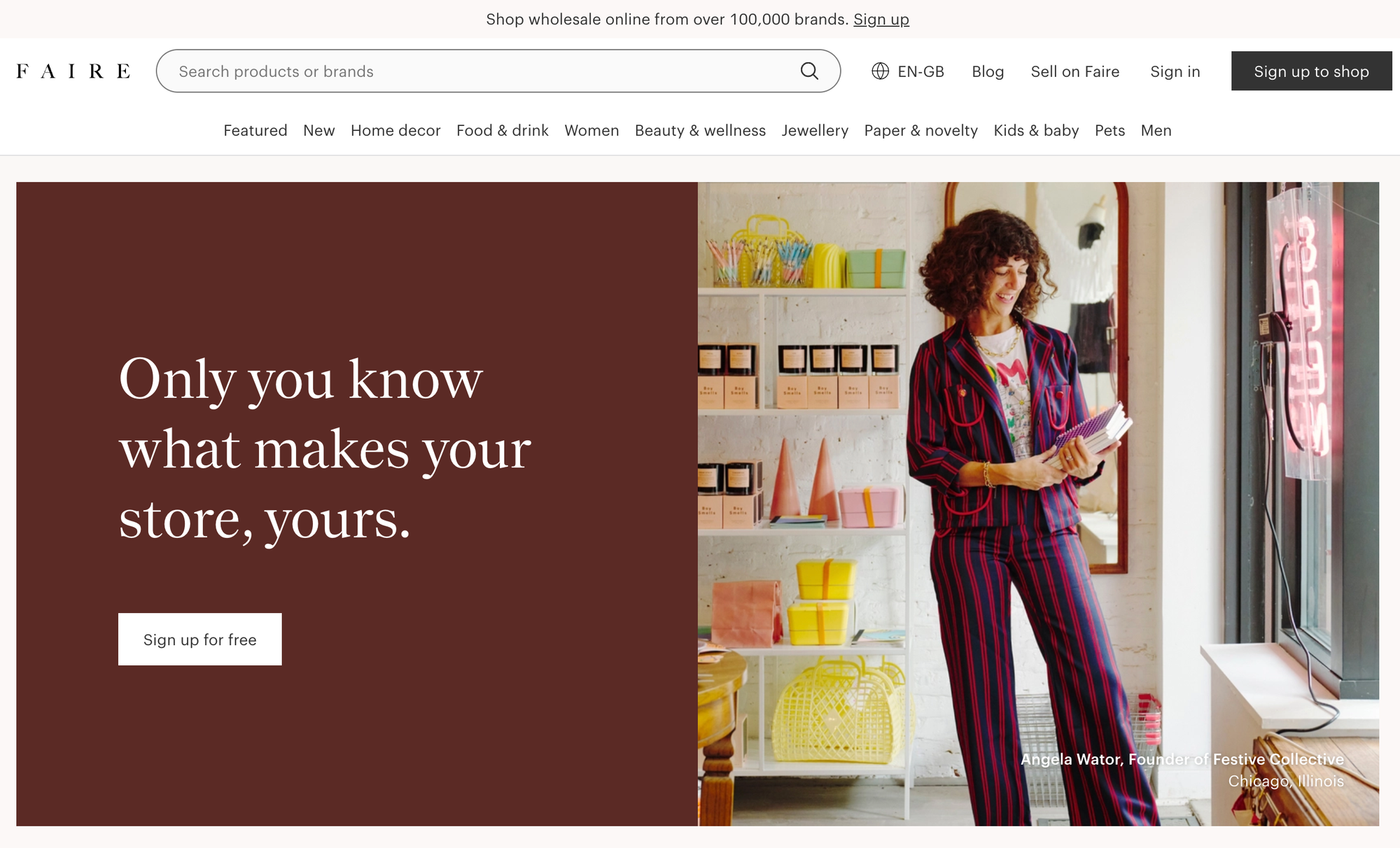
Faire is the world's first online wholesale marketplace, enabling independent retailers and brands to buy and sell at wholesale prices online. With over 500,000 independent retailers and 100,000 brands from 150 different countries, Faire is the largest platform of its kind. Built to empower brands and retailers, Faire makes it easier for local makers to get their products in independent-owned boutiques, stores, and retail locations.
Pros:
- Open with Faire program helps guide new retailers open their own store
- Offers stores up to $20k in 60-day payment terms
- Easy to use B2B platform including free ecommerce storefront for your products - Offers next day payouts to sellers.
Cons:
- Only fulfills orders for products that you intend to sell in your own boutique.
- Does not support dropshipping
- Does not support reselling on third-party marketplaces such as Amazon, eBay, and Poshmark.
4. Costco

While it’s primarily a bulk discount store for consumers, Costco is also a good source for resellers who want to find premium products at a bulk wholesale discount that they can sell individually.
The big box retailer requires a membership to purchase anything in their store, and in order to get wholesale products for resale, you’ll need to have a valid resale certificate.
Pros:
- Consistently high-quality, name-brand products
- No need for overseas shipping delays
- Excellent customer service
- Other membership perks and benefits
Cons:
- Price points can be high
- Must have a valid resale certificate
- Limited selection of products
5. SaleHoo
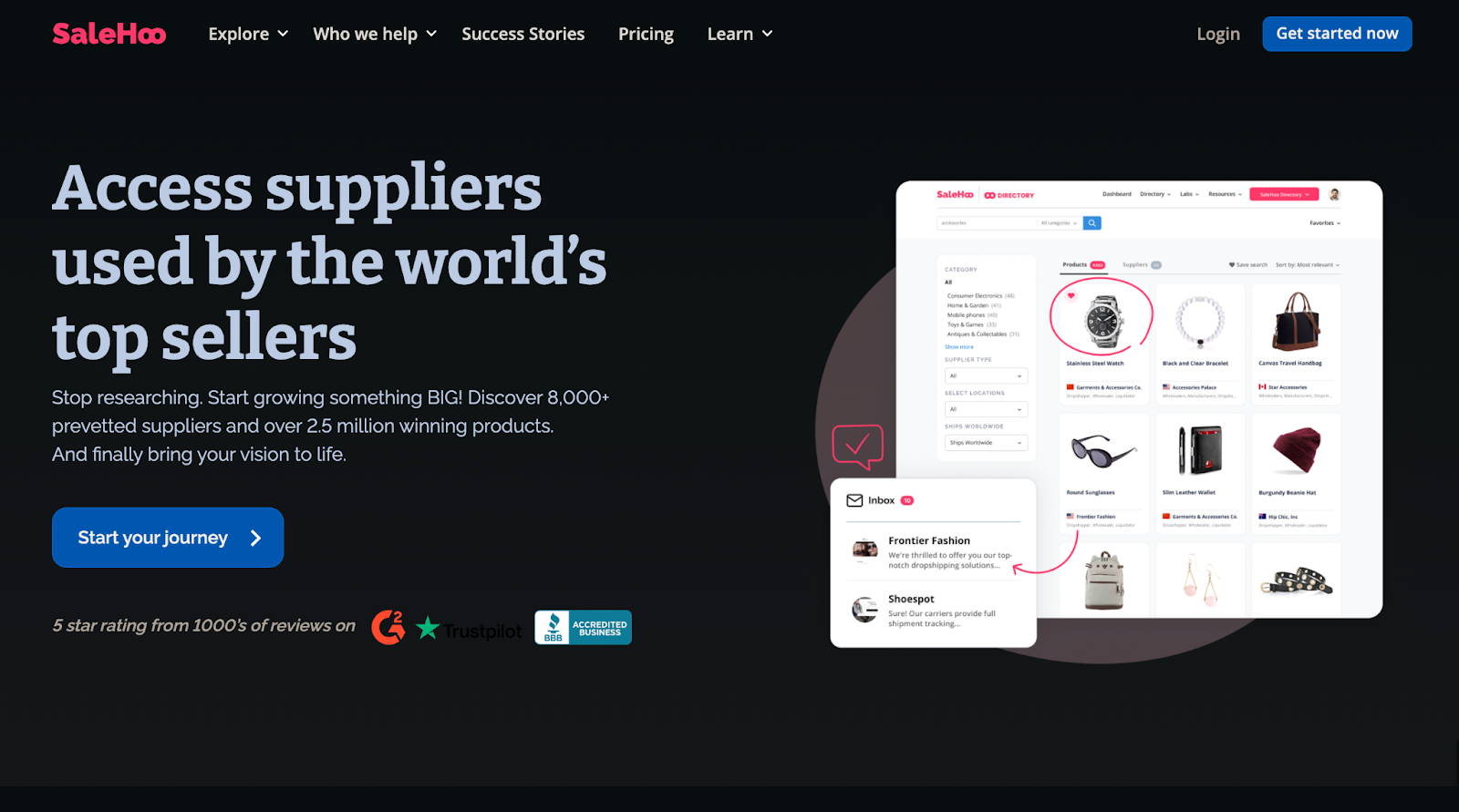
Salehoo is a directory that has a quality network of vetted suppliers for wholesale products. Since its foundation in 2005, it has gained a strong reputation amongst resellers who use its site to find their preferred supplier.
Suppliers on the platform can be found worldwide, with a good selection of domestic sellers in addition to overseas options. The company requires an annual membership of $67 to view its directory and contact suppliers.
Pros:
- Thorough vetting system keeps supplier standards high
- Concentrated and high-quality supplier network
- Good selection of domestic suppliers that are easy to communicate with
Cons:
- Requires a membership fee to use even the most basic functions of the site
- Pricing is not as competitive as Chinese wholesale sources
- Limited range of suppliers
6. Worldwide Brands
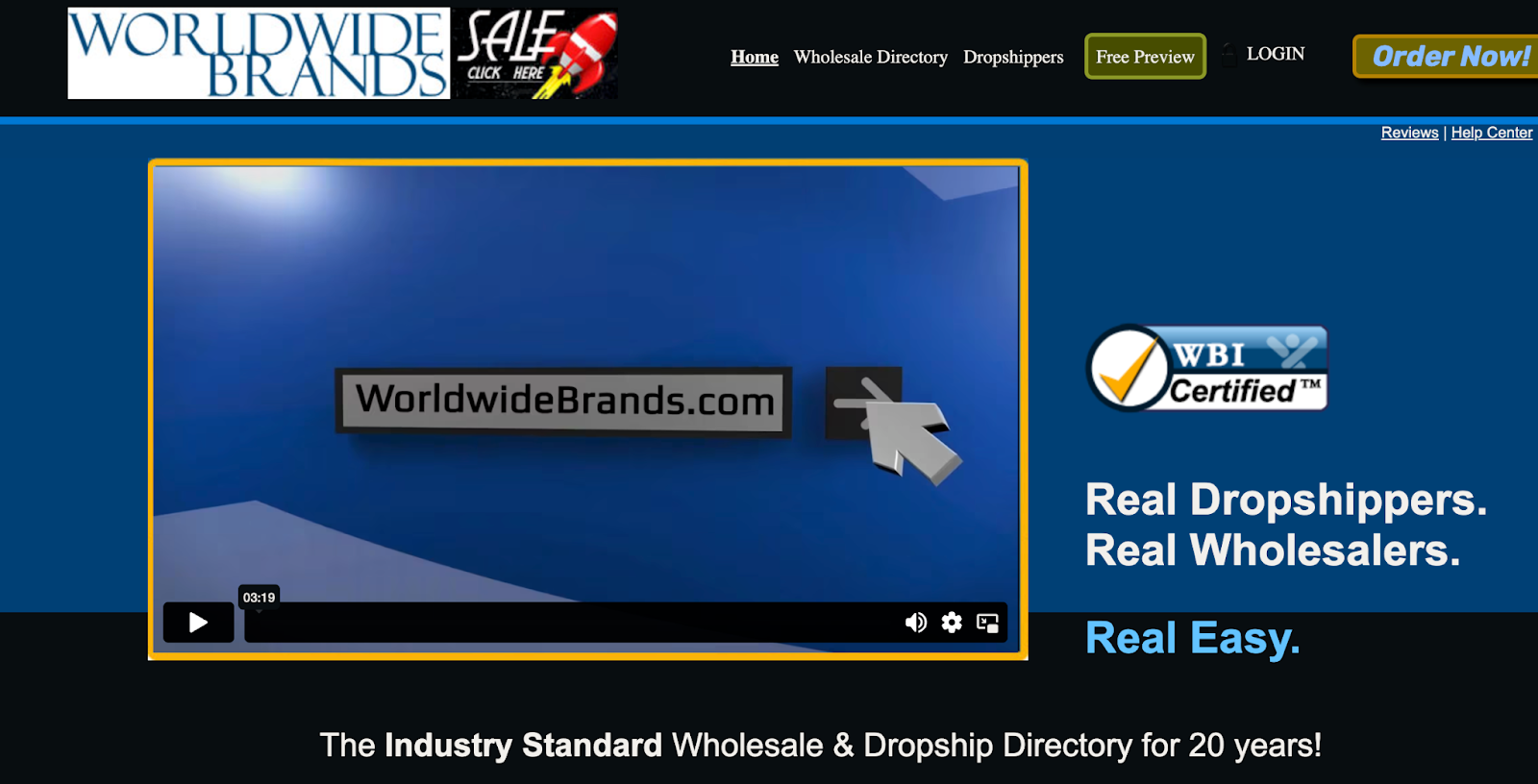
One of the original directories for finding wholesalers, Worldwide Brands has a strong history going back to the early days of ecommerce with its founding in 1999. The platform serves both dropshippers and wholesalers, and has an emphasis on fair pricing for profitable sourcing. All of its suppliers have been certified based on their standards, making for higher trust as a buyer. A one-time fee of $300 grants you lifetime access to their directory.
Pros:
- Large directory of trustworthy suppliers in numerous categories
- One-time fee means you don’t have to worry about recurring billing
- Focus on competitive wholesale pricing
- Can make lasting relationships with suppliers
Cons:
- $300 might be too high of a fee for some beginner resellers
- It takes time and effort to build a relationship with some suppliers
- Limited oversight of supplier operations
7. Global Sources
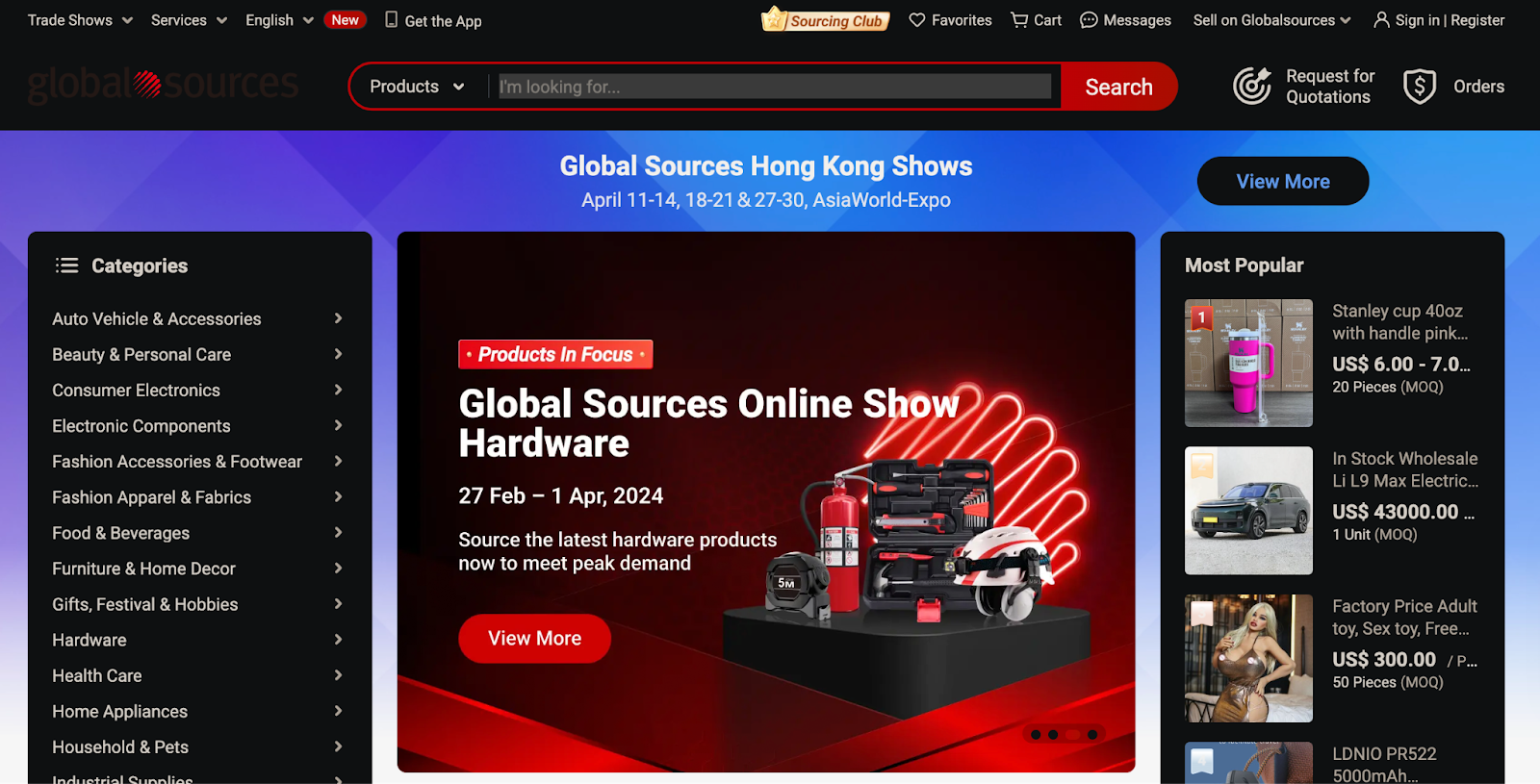
One of the most established wholesale directories, Global Sources was founded back in 1970 and has built a robust and vast network of suppliers and manufacturers.
Most of its vendors are based in Asia, and a good amount of their sellers are exclusive to the platform. The company also promotes trade shows across different industries, giving the opportunity to discover products and suppliers in person.
Pros:
- Opportunities for direct engagement with suppliers and their products in trade shows
- Strong history and a good reputation
- Large selection of products
- VIP buying community for qualified sellers
Cons:
- Relatively high MOQ
- Most suppliers are in Asia, which can have potential communication and logistical inefficiencies
- Less potential to acquire products at scale
- Lacking the standard of trade assurance compared to platforms like Alibaba
8. Discount Wholesalers
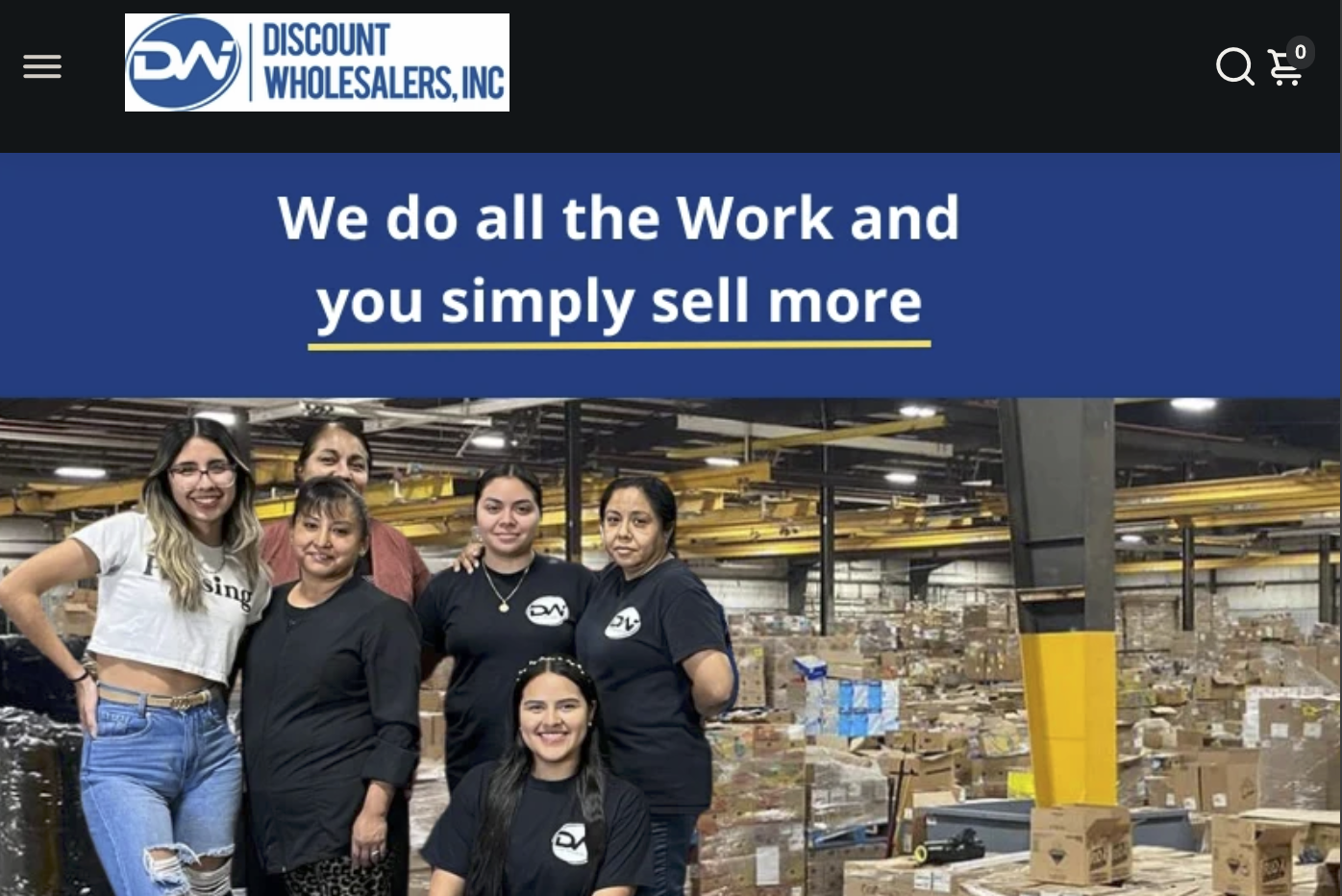
For resellers that want a reliable source for return pallets and closeout inventory, one of the best sources is Discount Wholesalers. They’ve been a leader in the liquidation industry with products that are mainly in the beauty industry.
They don’t discriminate against customers based on business size or history, and ordering product is as simple as buying it from their catalog.
However, all of their products are sold as is, so the quality can vary. Additionally, Discount Wholesalers only serves the US market.
Pros:
- No minimum order quantity
- Accurate pictures of the actual product
- Name-brand items can often be found at great prices
- Excellent pricing
Cons:
- Potential issues with product quality, particularly with returns
- The best batches often sell out quickly as they are broadcasted on a large public email list
- Some products don’t have active or consistent demand
- Products are often out of season and can potentially be expired
- Only serves the US market
9. Bargain Wholesalers
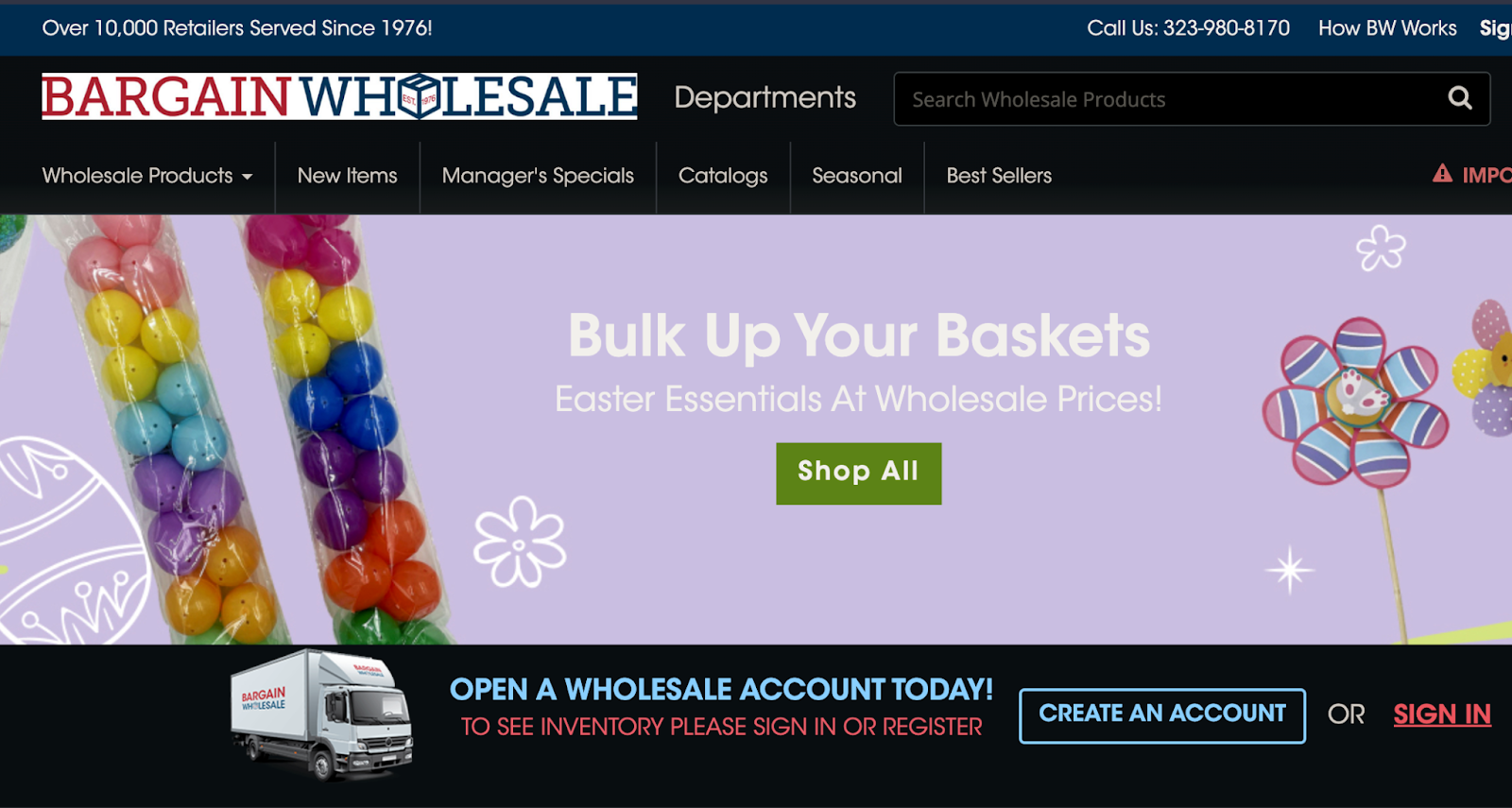
Bargain Wholesalers specializes in providing discounted bulk goods for resellers. It is friendly even to smaller businesses, with an MOQ that is relatively low.
Like Discount Wholesalers, the platform specializes in closeouts, overstock, returns, and liquidations. All you have to do to buy inventory listed on their website is to make an account as membership is totally free.
Pros:
- Lower MOQ
- Free to use and browse
- Highly discounted bulk inventory, including name-brand items
- Ability to browse in person at their Los Angeles warehouse
Cons:
- Restricted product selection and inventory size
- Household and beauty products that might be hard to resell, especially on Amazon
- Quality of returned products can vary and can include unusable inventor
- Only one warehouse location in Los Angeles
10. Kole Imports
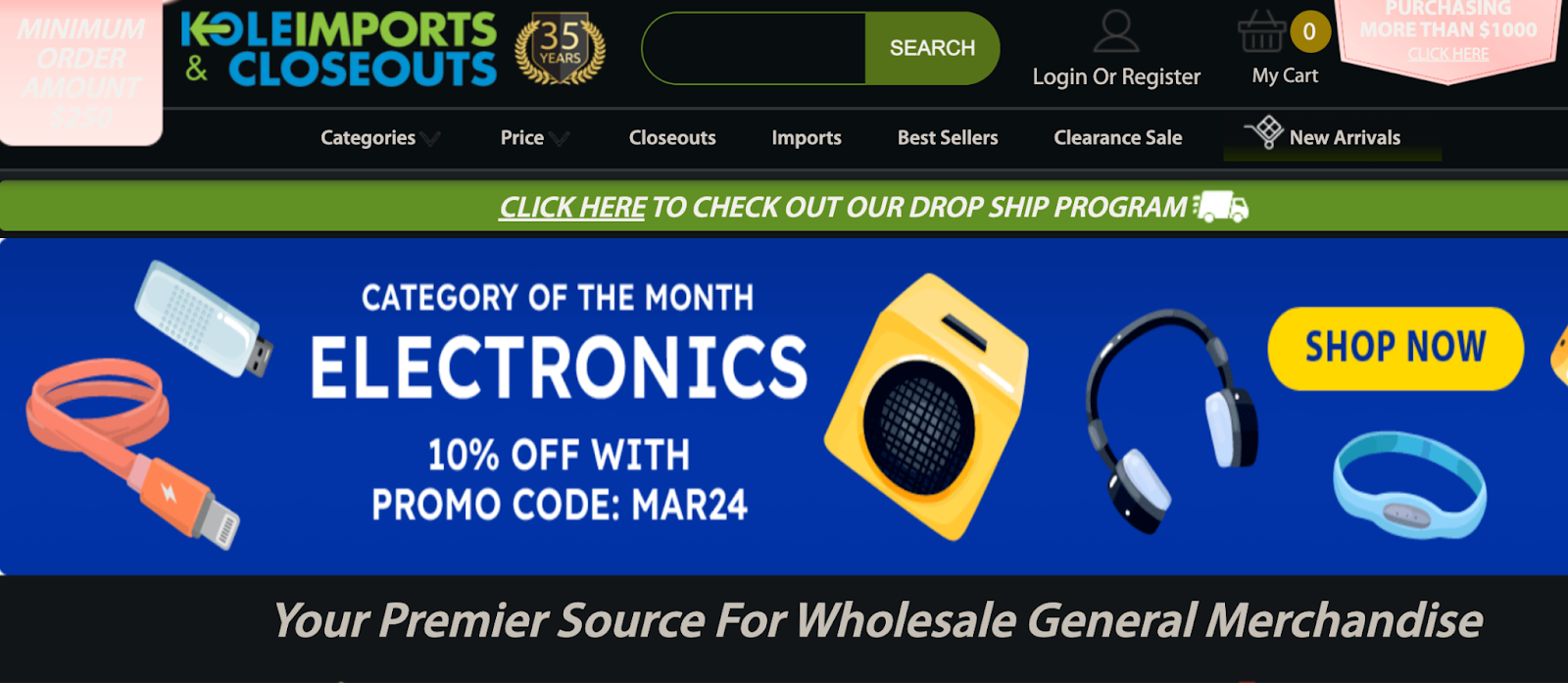
Another source for closeouts and wholesale general merchandise is Kole Imports, which has been in business since 1985.
Their product selection spans from broader items like electronics and beauty to more niche realms such as home decor and gifts.
They even have services that cater specifically for Amazon FBA resellers, which is a nice addition if you are in or plan to be an FBA seller.
Pros:
- Diverse range of products
- Good pricing with clearance and sale sections on top of existing discounts
- Has FBA services
Cons:
- Sometimes has minimum purchase requirements that aren’t friendly to new sellers
- The product quality can be inconsistent and returns aren’t accepted
- Primarily serves the US market only
11. Reydon Sports
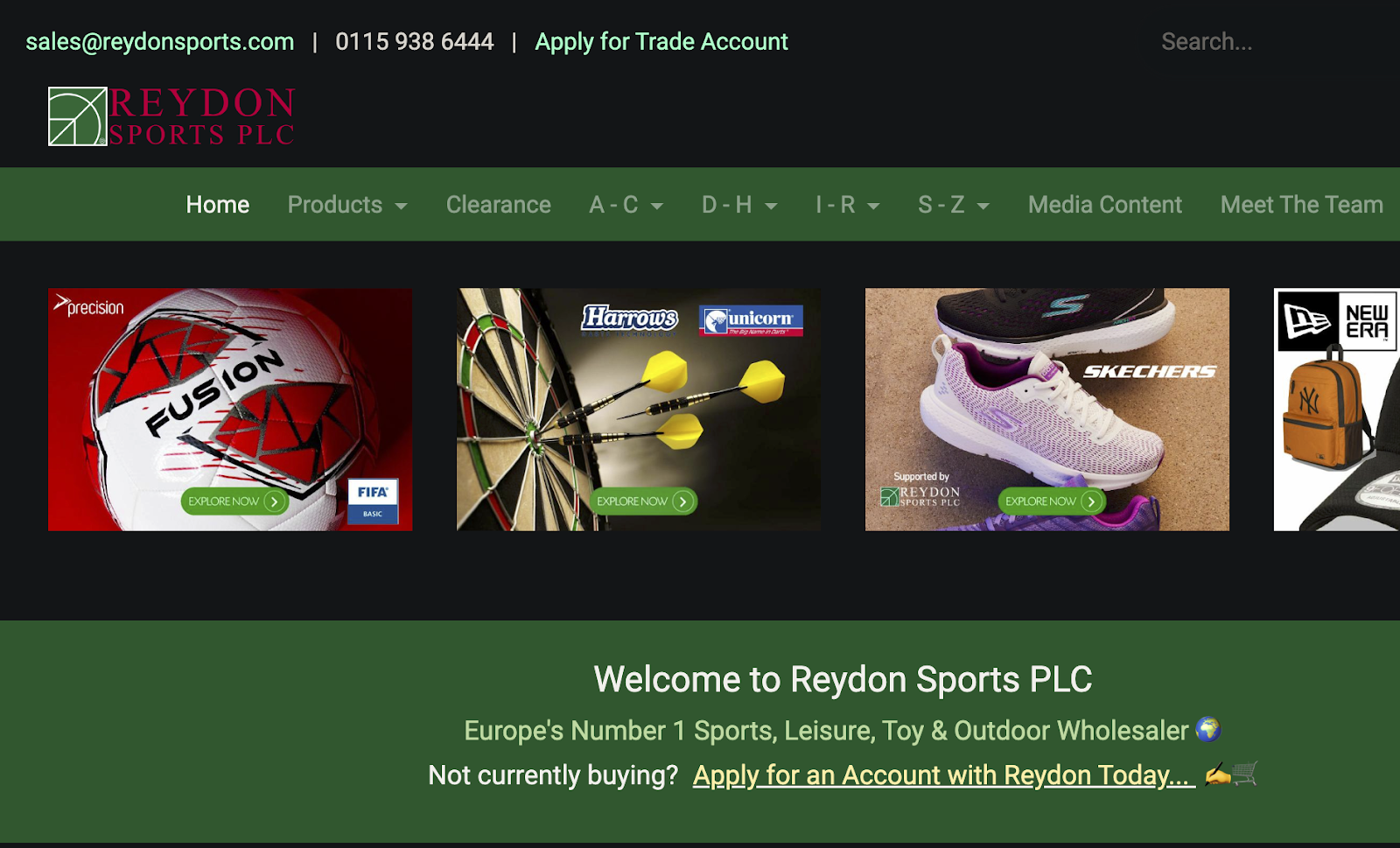
If you want a specialist in sporting goods, Reydon Sports is a leading supplier. They offer wholesale deals on just about any imaginable sporting-related products, including equipment, accessories, and merchandise.
In addition to familiar name brands, Reydon has developed a range of quality in-house products at competitive pricing for a variety of sports.
The company is based in the UK and primarily serves the European market.
Pros:
- Experts in the sporting goods industry
- High-quality selection of merchandise including brand names and in-house products
- Accepts returns with a reasonable policy
Cons:
- Limited only to sporting goods
- MOQs can be quite high for smaller resellers
- Primarily serves the EU market
What to Look for in a Wholesale Supplier
When seeking a wholesale supplier, you’ll first want to establish which types of products you want to sell, as that will help determine which supplier you will settle on.
You’ll also want to look for quality in a number of areas, including these:
Location and shipping
Shipping is one of the largest costs in ecommerce, both in fulfillment and in sourcing. If your supplier is far away, you may end up with shipping time and costs that end up being a dealbreaker. Additionally, if your supplier is local, you have the added benefit of being able to meet them in person which will allow you to thoroughly inspect products and establish a good working relationship.
Good reviews
Do as much independent research as you can in terms of finding reviews for the specific supplier you want to use. Some sites that aggregate suppliers such as Alibaba and DHGate will have individual reviews on the seller pages that you can view. With other platforms that don’t reveal individual suppliers, you’ll have to seek general reviews of their selection and services which can be found through searching the internet or browsing forums.
Expertise and history
The longer a business has been around and operating in its current realm, the more likely it is that they have a decent service with loyal customers. Many of the suppliers that we mentioned in the list have survived the test of time with at least a decade or two of existence. The company’s reputation for having expertise in its realm is also important and is correlated to how long they have been around.
Prompt and clear communications
One of the most important things in general with engaging in B2B transactions is communication. You want your communication with the supplier to be prompt and clear, with the ability to seek additional support if your first point of contact is presenting any issues. Keep in mind though that communication is a two-way street and that you also need to be clear and hold your word on promises in order to expect the same degree of professionalism in return.
What to ask a Potential Wholesale Supplier
After choosing what you want to sell and which supplier you want to work with, you’ll need to know what to communicate to them so that you can get what is good for your reselling business. Here’s a general guideline of what to ask for when communicating with a potential wholesale supplier:
Minimum order quantity
When dealing with a wholesale supplier, the first thing you’ll need to be aware of is if there’s a minimum order quantity, and if so, how much it is. You need the pricing to be in line with your target acquisition costs and profit margin. Sometimes in order to hit your desired cost basis you will need to increase your MOQ, and you can always ask your supplier how much of the product you need to order to get it at the price you want, if it’s at all possible.
Ask for a sample
If possible, ask for a sample of a product before buying it in bulk. The last thing you want is to be stuck with a pile of inventory of questionable quality. Some suppliers may not allow for samples, but in that case, be sure to check for the return policy in addition to inspecting the product as much as you possibly can without having it in hand before committing to a purchase.
Qualifications
Certain suppliers have qualifications for who they choose to do business with, while others will sell their product to anyone who is willing to buy. Before dealing with a supplier, be sure to check if you need anything in advance before you try making a purchase with them. Sometimes the qualification can mean paying them a membership fee, and other times it might mean having a resale certificate or a certain type of registered business in order to deal with them.
Exclusivity
Having an edge against competition comes in many forms, and sometimes you can establish this with a certain degree of exclusivity between you and a wholesale supplier. Ask your supplier if there is any possibility for exclusive deals or sole rights to a product. You may have to meet a large minimum order quantity and establish business history before asking this, but you may get to the point where you get first dibs on valuable inventory. This might be more possible if you meet a supplier in person.
Find Your Wholesalers with Whop
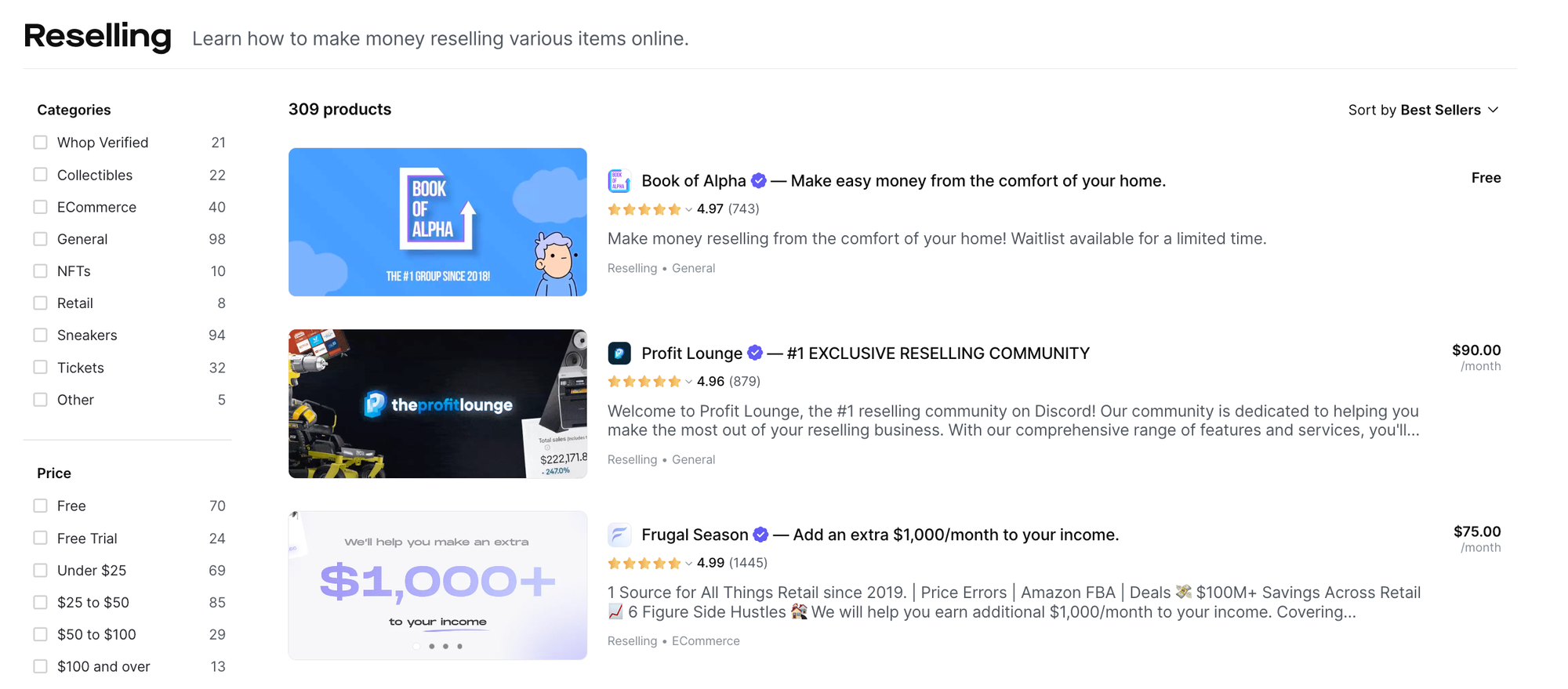
Finding a good wholesaler is just one of the many ingredients to becoming a profitable reseller, which requires in-depth knowledge and expertise for you to be able to compete against other stores that are trying to profit using similar methods.
If you want to get ahead of the competition with a dedicated environment for all of your ecommerce and reselling needs, including advice on how to find the best wholesalers, check out Whop’s collection of private ecommerce and reselling Discord communities.
Inside, you’ll get step-by-step guidance and resources for finding wholesale or steeply discounted products that you can resell for profits.
Join a group that fits your needs today and you’ll be one step closer to being able to count yourself amongst the group of entrepreneurs who are building life-changing businesses online.
Wholesale FAQs
What does it mean to buy wholesale?
Buying wholesale means making a purchase in bulk. This typically means you are buying several of the same item, but you can also buy a wholesale lot of assorted items if you are purchasing something like a liquidation pallet. The reason people buy goods wholesale is because they get the item at a cost per item that is profitable to sell individually as a reseller.
Do I need a wholesale supplier if I’m a reseller?
Not every reseller has a wholesale supplier, but if your goal is to operate a resale business at scale, you’ll be better off finding one to work with. This is because having a wholesale supplier provides numerous benefits, including more profitable price points, a consistent source of inventory and the potential to scale.
Can I become a wholesaler?
If you have direct access to a company’s goods in large bulk quantities and you want to sell wholesale to other businesses that intend to resell the product individually, you can choose to become a wholesaler. However, you should understand that being a profitable wholesaler means having a large budget and dealing with large volume to gain profits as the margins are often slim.
How much budget do I need to work with a wholesaler?
Depending on the wholesaler you are working with, your budget will vary. Some wholesale suppliers have flexible minimum order quantities that are friendly to sellers with modest bankrolls, whereas others might have MOQs that require having deeper pockets. Be sure to check for the MOQ you need to get your product at a cost basis that will make you profitable
Where can I find the best wholesalers?
The best wholesalers are either found online individually or inside of a wholesale supplier directory. Be sure to review each potential supplier individually and choose the one that is best for your individual product needs and business goals as their ideal customer base can vary drastically. You might also be able to find a wholesale relationship with a company that you already know locally or online.


![Top 18 best ticket reselling Discord servers [November 2024]](/blog/content/images/size/w600/2023/12/Top-Ticket-Reselling-Discord-Servers--1-.webp)
![Top 22 best sneaker reselling Discord servers [2024]](/blog/content/images/size/w600/2024/01/sneaker-reselling-discord.webp)
![Top 26 best reselling Discord servers [November 2024]](/blog/content/images/size/w600/2023/09/reselling-discords.webp)
